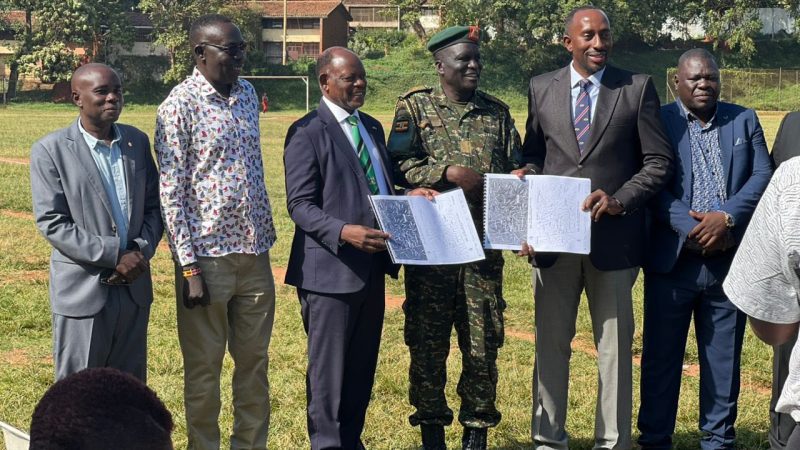The Constitution ( Amendment) Bill 2017 which was read for the First time in Parliament and referred to the Committee on Legal and Parliamentary Affairs last week is not only unconstitutional but also illegal and brought in bad faith and should be opposed and rejected by all good loving Ugandans on the following grounds:
1. The Bill as presented particularly clauses “3” and “4” thereof is inconsistent with and in contravention of Article 26(2) (b) (i) of the Constitution in as far as it seeks to permit Government to take over the property of a person objecting to the compensation awarded before compensation is promptly paid.
This obvious contradiction makes it inconsistent with and in contravention of Article 26 and therefore unconstitutional.
2. The Bill as presented to the extent that it contradicts Article 26(2) b(i) does not comply with Article 259 (1) of the Constitution since the amendment envisaged is by way of “addition, variation of repeal” and the contradiction which amounts to an inconsistency and/or contravention of Article 26(2) (b) (i) cannot be interpreted to be an “ addition, variation or repeal.
The Bill is therefore unconstitutional as it contravenes Article 259 (1) of the Constitution in respect of the manner in which the constitution may be amended.
3. The Bill is for all intents and purposes a replica of S. 7 (i) of the Land Acquisition Act, Cap 226 Laws of Uganda which states thus
“Where a declaration has been published in respect of any land the assessment officer shall take possession of the land as soon as he or she has made his or her award under Section 6 except that he or she may take possession at any time after publication of the declaration if the Minister certifies that it is in the public interest for him or her to do so”
This section in the Land Acquisition Act permits Government to take possession of property before payment of compensation to the property owner. The Bill as presented is on all fours with this section.
In Constitutional Appeal No. 02 of 2014 in the Supreme Court of Uganda between Uganda National Roads Authority vs Irumba Asumani and Peter Majelah where Government in the process of upgrading Hoima-Kaiso-Tonya Road proceeded under S. 7 (i) of the Land Acquisition Act to compulsorily acquire land from people affected by the road project without prior payment of compensation, the Supreme Court upheld the decision of the Constitutional Court which had held that
“ a. That S. 7 (1) of the Land Acquisition Act is hereby nullified to the extent that of its inconsistency with Art 26(2) of the Constitution.
That is to say to the extent that it does not provide for prior payment of compensation before government compulsorily acquires or takes possession of any person’s property.
b. It is hereby declared that the acts of taking possession of the 2nd Respondent’s land prior to payment of compensation contravened his right to property as enshrined in Article 26(2) of the 1995 constitution”.
Since this Bill seeks to re-enact the principle in S.7 (i) of the Land Acquisition Act which was nullified by the Supreme Court ( the highest court in the land) Parliament under Article 92 of the Constitution is restricted from passing this law whose effect is to alter the judgment or decision of the Constitutional Court as upheld by the Supreme Court.
To that extent therefore this Bill is unconstitutional as it contravenes Art 92 of the Constitution.
4. The Bill as presented is not the one envisaged under Article 26(2) b since a law to provide for compulsory acquisition that provides for
“ (i) prompt payment of fair and adequate compensation prior to taking possession or acquisition of property” is yet to be brought to Parliament for passing . If the Government was to proceed in good faith it would have brought a law under Article 26(2) b that would adequately cover the areas it seeks in this Bill or alternatively bring amendments to the 1965 Act – the Land Acquisition Act.
5. The Bill as presented does not envisage the various interests that may affect one piece of land particularly registered land which may have other interests such as lawful/bonafide occupants as recognized under article 237(8 and 9) of the Constitution whose right to access court under Articles 26(2) (ii) and Article 42 of the Constitution and who may have nothing to do with “quantum of compensation” and yet may be affected by the compulsory acquisition and taking possession of the land by Government. The interests of such persons and others such as spouses, mortgagee Banks, purchasers etc when a matter that deals with compulsory acquisition of land can best be dealt with in a law envisaged under Art. 26(2) b but not this Bill.
6. The Bill as presented creates two classes of victims of compulsory land acquisition – those paid prior to acquisition and those whose payment is deposited in court and to that extent is discriminatory and offends Article 21 of the Constitution.
7. The Bill if passed into law will create land ownership insecurity since the numerous Local Governments from Local Council 3 to 5 in the whole country and the Central Government may descend on citizens for land to build markets, police and army posts and barracks , demonstration centres etc and privately held lands will within a short time turn to Government whose use of Public lands has left a lot to be desired. If Government has misused its own land what about that which it will compulsorily acquire without prior payment.
This land insecurity will affect individual citizens plans to develop the lands, will affect land use particularly food security and may lead to landlessness famine and abject poverty in the long run.
8. The object of the Bill and therefore its motive is insincere.
There is no reason as to why there would be redundant machinery at the cost of government if government carefully planned execution of its projects through doing first namely; carrying out things first Feasibility study, Design, Land Acquisition, and finally procurement of contractors.
The problem cited in the object of the Bill can be solved even administratively without amending the constitution.
9. The Bill which provides for depositing money in court without stipulating the procedure as to how this can be done and which court indirectly undermines the independence the judicially as stipulated under article 128 since the court is now
being used to perform an executive function. The matters in the bill under clauses 3,4 and 5 can best be handled under a law envisaged under Article 26(2) b without amending the constitution as proposed.
10. Lastly and more importantly it should be remembered that when the 1995 constitution was being promulgated H.E the President expressed reservations and misgivings only on chapter Fifteen and he specifically mentioned Land.
The Constituent Assembly under Article 237 vested land in Uganda to its citizens and yet the President has all along preferred the position of the Land Reform Decree of 1975 passed by Idi Amin Dada which vested land in Uganda in the Government
Many Ugandans know how the current government is personified in the person of Y.K Museveni who would wish to be the sole Landlord as the Chief Executive Officer of Uganda Government. The sole landlord would then determine who gets which piece of land, who uses which land and for what purpose.
Those with big chunks of land such as the Churches , Mosques, Kingdoms and individuals would have to dance to his whims for them to retain usage and semblance of ownership of their lands. The ploy to compulsorily acquire land is fused with the ploy to rule for life by lifting the age limit so that the person in charge of the State is wholly in charge of land acquisition and distribution and therefore the social economic and political lives of all Ugandans must be aligned to the wishes of the sole landlord.
When this happens then Ugandans will have to forget anything to do with their rights, freedoms and liberties and must endure slavery and total subjugation.
It is for the above reasons that this Bill must be rejected.
For God and My Country
Winnie Kiiza is the Leader of Opposition in Uganda’s Parliament, and also Kasese Woman MP








